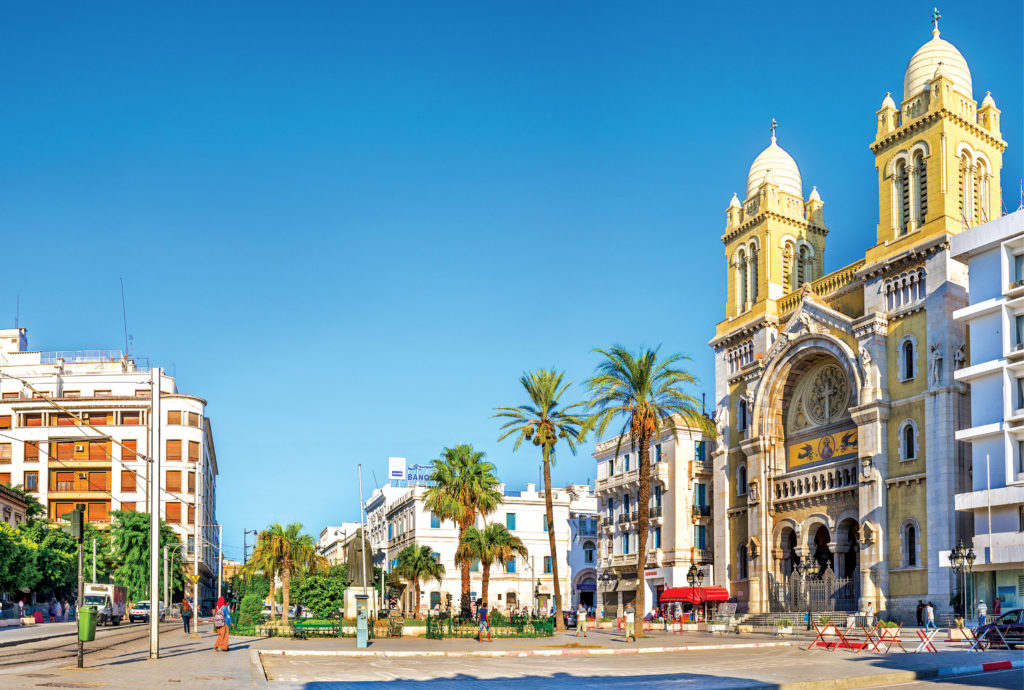Cited five years ago as the cradle from which the Arab Spring engulfed the Middle East with protests, rebellion, and other expressions of public discontent, Tunisia has since found itself receiving the full ire of Muslim extremism. Instead of celebrating its historic role in liberating the region from brutal dictatorships, the country found itself targeted by terrorists as the freedom it once craved slowly receded into lockdown.
In the next few months, the final touches will be placed on a 125-mile barrier of trenches and sandbanks along half its 285-mile border with Libya. Tunisia’s intention is to create what officials have named an “anti-jihadi wall” in order to prevent terrorists stepping from IS-linked training camps in Libya and straight onto Tunisian soil.
This curious and crude fortification is punctuated along its length with watchtowers and security posts – many of which are being paid for by the German and US governments.
To the outside world, it would undoubtedly appear a sad and desperate measure to take. After all, this is the country that drew a line in the sand and declared enough was enough before facing up to its stifling regime and inspiring other Arab nations to do likewise. It now appears as though Tunisia is gouging a very different mark in its sands.
Are we seeing the land that engineered its own freedom begin to slip away into the deep waters of repression, or is there more to what meets the eye in Tunisia’s prolonged battle with itself and its unruly neighbours?
It’s hard to think what answer Mohamed Bouazizi would have to that question, if he were still alive. Mr Bouazizi is credited with being the trigger that started the uprising and, in turn, the Arab Spring itself.
It was his dramatic and desperate protest that set off a wave of violent demonstrations over unemployment throughout the North African nation. A jobless 26-year-old, Mr Bouazizi had been searching for work most of his adult life. He chose to sell fruit and vegetables in Sidi Bouzid in an attempt to earn something of a living. His produce and cart were confiscated by the police and government officials who demanded money for a permit, issuing a 10 dinar fine in the process.
It was the final straw for Mr Bouazizi – the main breadwinner in a household of eight. Like thousands of other disenchanted young men in Tunisia, he’d had his fill of being punished for trying to do something with the abject nothingness of life. Unlike his peers, however, Mr Bouazizi’s actions went beyond the shared desperation of a generation.
He marched to the town hall to remonstrate with local officials who flatly refused to even speak with him. He left, but returned an hour later. Outside the lavish municipal offices, at 11.30 am on December 17, 2010, he knelt at the gates and doused himself with petrol. Without even pausing for thought, he set himself alight.
The young man didn’t die in the street. Instead, he was taken to the nearest hospital, with news of his protest spreading quickly. As he lay in intensive care, public outrage was simmering close to boiling point, prompting then president Zine el Abidine Ben Ali and his spin doctors to visit the stricken Mr Bouazizi’s bedside. The transparent nature of the appearance didn’t go unnoticed and did nothing to stifle the outcry that was brewing in the streets.
Ten days after Mr Bouazizi passed away on January 4, Ben Ali’s dictatorial reign over Tunisia came to an abrupt end. The enraged Tunisian people had spoken and acted. The Arab Spring had begun, and the rest is history.
Fast-forward to 2016 and, on the surface, it looks like little has changed.

This all paints a bleak and dire picture. But then, Tunisia’s political image has never been much of an oil painting. Yet, beneath the cracks and the discoloured undulations, the canvas of this extraordinary and proud nation is remarkably undamaged by the ravages of recent history.
Scratch the surface, and the truth of what Tunisia is, and indeed intends to be, becomes apparent. Despite all the horrors, the tyranny, and shattered dreams, here lies a country that is still standing tall. Write Tunisia off at your peril.
Since the 2011 uprisings, several Arab Spring states have been devoured by terrorism and allowed themselves to slide back to square one. Tunisia, however, despite being the victim to some sickening atrocities, is refusing to relinquish the grip it fought so hard to wrap around its own freedom.
Following the Bardo Museum attack in March last year, and the Sousse attacks in June, Tunisia collectively decided it was time to stand up and be counted. If it were possible that any good could possibly arise from the deaths of 38 tourists, it would be the legacy of it being the moment Tunisia embarked on what is being described as the second coming of the Arab Spring.
And with that fresh impetus comes the lengthy fortification of its border with Libya – a sign to the west that Tunisia is serious about its reformation. But it’s not just the visible factors like seeing giant defences being created to keep terrorists out, there’s also the guile of the Tunisian people to contend with. Particularly the younger generations who empathised and were affected by the drastic actions of Mohamed Bouazizi and everything he stood for.
There’s a culture shift in this North African country that, just like the beginning of the 2011 revolution, may well indeed spill over into other Arab nations keen not to be swallowed by the creeping spread of the Islamic State.
Against all the odds, Tunisia is giving its all for a proper crack at modernisation and the advancement of Islamic liberalism. There has long been a desire for a vision of Islam in harmony with modern values and science, but it has only been in the last five years that people have dared to allow their support for such new ideals float to the surface.
Tunisia remains the leading light of reformation in a region where the laborious process of democratic metamorphosis is proving to be more painstaking and fragile than any observer had imagined. Yet through tenacity and dedication, the Tunisian people have risen to the challenge.
Take Rachid Abdennour for example. He’s a 31-year-old computer programmer who began working in Tunis at the end of 2015 after spending six years without even a glimpse of a job. He spoke to CFI.co and explained that it was the self-sacrifice of Mohamed Bouazizi that gave him the hope of a future for his country, and delivered inspiration to thousands like him.
“Tunisian people love and believe in Tunisia,” he told us. “I had a qualification and nothing else – just the same as my neighbours, their neighbours, and all the young men of our nation, but Mohamed Bouazizi gave us hope, and that’s something we’ve all had since he gave his life for the freedoms of Tunisia.”
“Look how we are rebuilding. Infrastructure, jobs, opportunities – all things that were not in our path during the days of Ben Ali. We’ve built something here that will not give in to the forces of oppression, and it has given us all hope for the future which we hope will deliver hope to other Arab nations.”
“We know this hope will carry us to a better future because we know that, without this hope, we are all Bouazizis.”
Throughout the Islamic world, military and religious values have spent centuries dominating science and peaceful advancement, and it took an illegal fruit seller’s suicide to start a mass uprising against both. Once again, it appears that Tunisia is proving itself as the crucible in which the ingredients for a more harmonic existence are to be mixed.





























